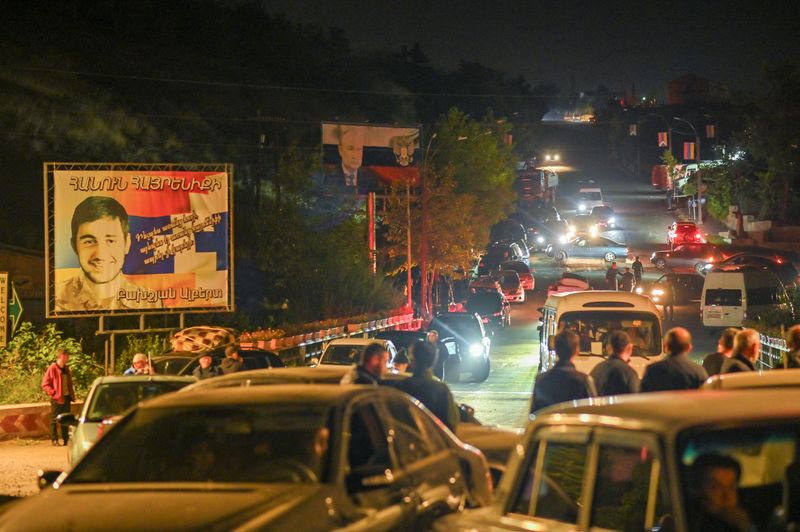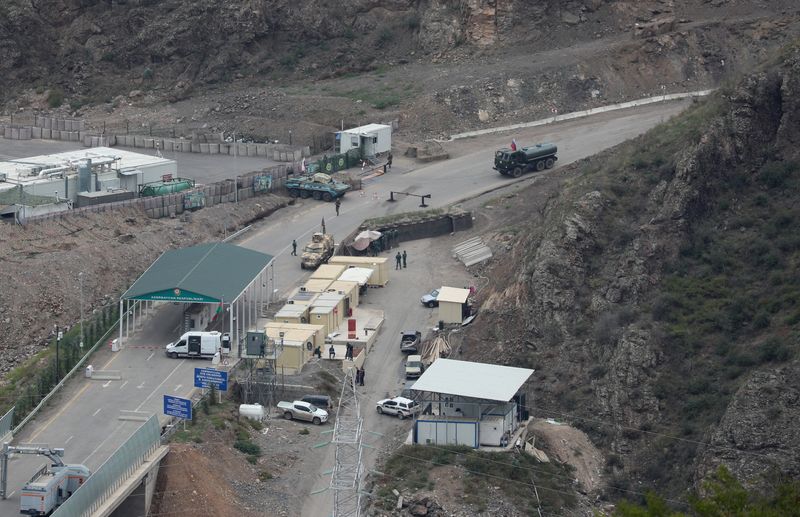STEPANAKERT, Azerbaijan (Reuters) -Ethnic Armenians in Nagorno-Karabakh began a mass exodus by car on Sunday toward Armenia after Azerbaijan defeated the breakaway region's fighters in a conflict dating from the Soviet era.
The Nagorno-Karabakh leadership told Reuters the region's 120,000 Armenians did not want to live as part of Azerbaijan for fear of persecution and ethnic cleansing.
Those with fuel had started to drive down the Lachin corridor toward the border with Armenia, according to a Reuters reporter in the Karabakh capital known as Stepanakert by Armenia and Khankendi by Azerbaijan.
An Armenian government statement said 1,050 people had crossed into Armenia from Nagorno-Karabkah as of 10 p.m. (1800 GMT) on Sunday.
Reuters pictures showed dozens of cars driving out of the capital toward the corridor's mountainous curves.
The Armenians of Karabakh, a territory internationally recognised as part of Azerbaijan but previously beyond its control, were forced into a ceasefire last week after a 24-hour military operation by the much-larger Azerbaijani military.
Armenia and Azerbaijan have fought two wars over the enclave in 30 years -- with Azerbaijan gaining back swathes of territory in and around Nagorno-Karabakh in a six-week conflict in 2020.
Turkish President Tayyip Erdogan, who backed the Azeris with weaponry in the 2020 conflict, was due on Monday to meet Azerbaijan President Ilham Aliyev in Nakhchivan -- a strip of Azeri territory nestled between Armenia, Iran and Turkey.
Erdogan last week said he supported the aims of Azerbaijan's latest military operation but played no part in it.
The Armenians are not accepting Azerbaijan's promise to guarantee their rights as the region is integrated.
"Ninety-nine point nine percent prefer to leave our historic lands," David Babayan, an adviser to Samvel Shahramanyan, president of the self-styled Republic of Artsakh, told Reuters.
"The fate of our poor people will go down in history as a disgrace and a shame for the Armenian people and for the whole civilised world," Babayan said. "Those responsible for our fate will one day have to answer before God for their sins."
The Armenian leaders of Karabakh said that all those made homeless by the Azerbaijani military operation and wanting to leave would be escorted to Armenia by Russian peacekeepers.
Reuters reporters near the village of Kornidzor on the Armenian border saw some heavily laden cars pass into Armenia. Armenia said 377 refugees had arrived by Sunday evening.
FEARS OF VIOLENCE
Armenia Prime Minister Nikol Pashinyan has faced calls to resign for failing to save Karabakh. In an address to the nation, he said some aid had arrived but a mass exodus looked inevitable.
"If proper conditions are not created for the Armenians of Nagorno-Karabakh to live in their homes and there are no effective protection mechanisms against ethnic cleansing, the likelihood is rising that the Armenians of Nagorno-Karabakh will see exile from their homeland as the only way to save their lives and identity," he said, according to an official transcript.
The situation could change the delicate balance of power in the South Caucasus region, a patchwork of ethnicities crisscrossed with oil and gas pipelines where Russia, the United States, Turkey and Iran vie for influence.
Last week's Azerbaijani victory appears to end one of the decades-old "frozen conflicts" of the Soviet Union's dissolution. Aliyev said his "iron fist" had consigned the idea of an independent ethnic Armenian Karabakh to history and that the region would be turned into a "paradise."
Armenia says more than 200 people were killed and 400 wounded in the Azerbaijani military operation.
FIRST KARABAKH WAR
Nagorno-Karabakh lies in an area that over centuries has come under the sway of Persians, Turks, Russians, Ottomans and Soviets. It was claimed by both Azerbaijan and Armenia after the fall of the Russian Empire in 1917. In Soviet times it was designated an autonomous region within Azerbaijan.
As the Soviet Union crumbled, the Armenians there threw off nominal Azeri control and captured neighbouring territory in what is now known as the First Karabakh War. From 1988 to 1994 about 30,000 people were killed and more than 1 million -- mostly Azeris -- displaced.
In 2020, after decades of skirmishes, Azerbaijan won a decisive 44-day Second Karabakh War. That war ended with a Russian-brokered peace deal Armenians accuse Moscow of failing to guarantee.
The Armenian authorities in the region on Saturday said about 150 tonnes of humanitarian cargo from Russia and another 65 tonnes of flour shipped by the International Committee of the Red Cross had arrived in the region.
With 2,000 peacekeepers present, Russia said that under the terms of the ceasefire, six armoured vehicles, more than 800 small arms, anti-tank weapons and portable air defence systems, plus 22,000 ammunition rounds had been handed in by Saturday.
Space for 40,000 people from Karabakh had been prepared in Armenia. Azerbaijan, which is mainly Muslim, has said that the Armenians, who are Christian, can leave if they want.
Pashinyan on Sunday blamed Russia for failing to do enough for Armenia, which he said would review its alliance with Moscow.

"Some of our partners are increasingly making efforts to expose our security vulnerabilities, putting at risk not only our external, but also internal, security and stability while violating all norms of etiquette and correctness in diplomatic and interstate relations, including obligations assumed under treaties," Pashinyan said in his Sunday address.
Russian officials say Pashinyan is to blame for his own mishandling of the crisis.
